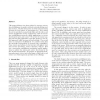Free Online Productivity Tools
i2Speak
i2Symbol
i2OCR
iTex2Img
iWeb2Print
iWeb2Shot
i2Type
iPdf2Split
iPdf2Merge
i2Bopomofo
i2Arabic
i2Style
i2Image
i2PDF
iLatex2Rtf
Sci2ools
116
click to vote
SIGCOMM
1995
ACM
1995
ACM
Two Issues in Reservation Establishment
This paper addresses two issues related to resource reservation establishment in packet switched networks o
ering realtime services. The
rst issue arises out of the natural tension between the local nature of reservations (i.e., they control the service provided on a particular link) and the end-to-end nature of application service requirements. How do reservation establishment protocols enable applications to receive their desired end-to-end service? We review the current onepass and two-pass approaches, and then propose a new hybrid approach called one-pass-with-advertising. The second issue in reservation establishment we consider arises from the inevitable heterogeneity in network router capabilities. Some routers and subnets in the Internet will support realtime services and others, such as ethernets, will not. How can a reservation establishment mechanism enable applications to achieve the end-to-end service they desire in the face of this heterogeneity? We propose an approach ...
Communications | End-to-end Service | Reservation Establishment | Reservation Establishment Protocols | SIGCOMM 1995 |
Related Content
| Added | 26 Aug 2010 |
| Updated | 26 Aug 2010 |
| Type | Conference |
| Year | 1995 |
| Where | SIGCOMM |
| Authors | Scott Shenker, Lee Breslau |
Comments (0)

